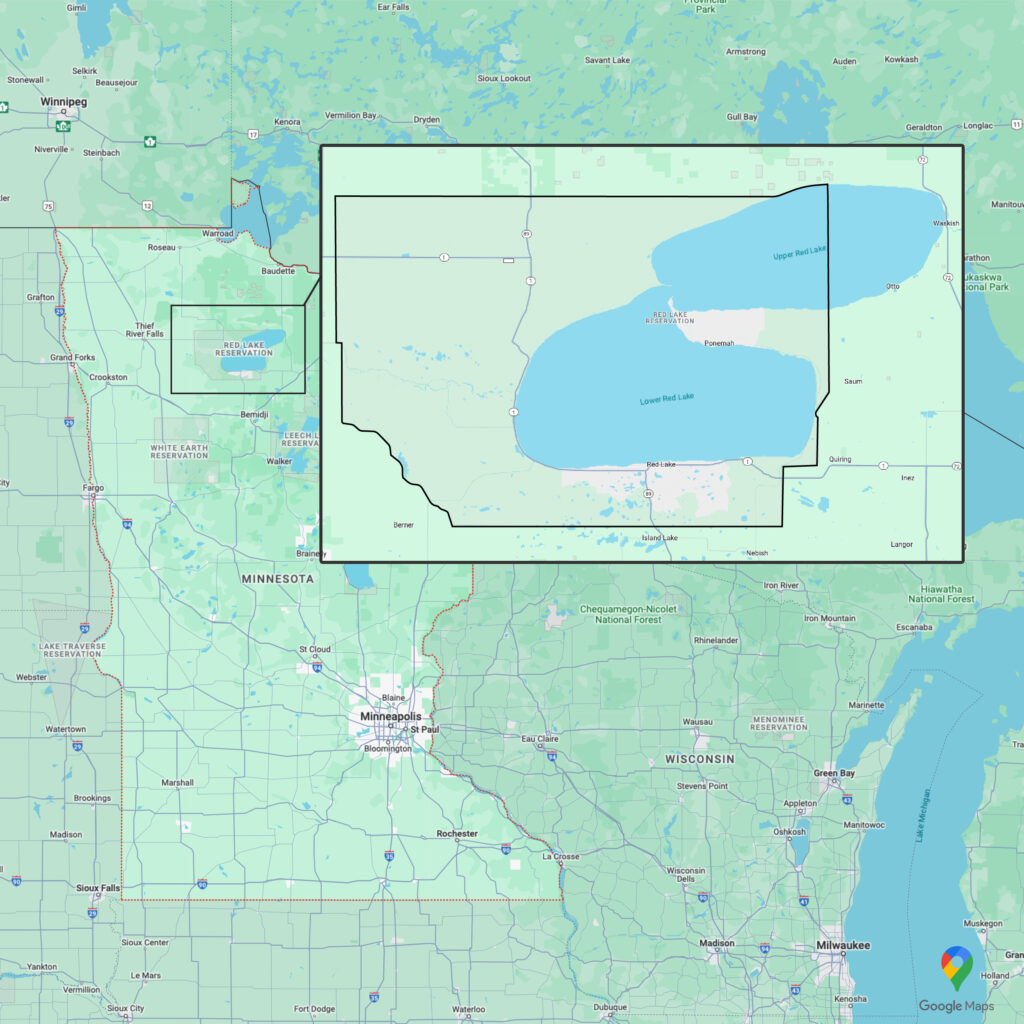
A new bill proposes to transfer state lands encompassing Upper Red Lake in northern Minnesota to the Red Lake Band of Chippewa. Although this proposal at the legislature is recent, the idea of tribal jurisdiction over the Upper area of Red Lake is a long-standing affair.
This is Minnesota Native News. I’m Marie Rock. This week, historical context and contemporary impacts of the proposed Upper Red Lake and Red Lake State Forest Land Transfer. Emma Needham has more.
Emma Needham: The Red Lake Nation is a unique place. Unlike other tribes in Minnesota, it retains the entirety of reservation land, including most of the lake. Other tribes in the state and United States share land parcels with non-tribal citizens; something the Red Lake founding leaders did not agree with. When negotiating the treaty of 1889, which established the Red Lake reservation with the United States, tribal leaders communicated their demand that both Upper and Lower Red Lake to be under Red Lake tribal authority. This important detail was omitted from the treaty agreement. Joe Plumer, Legal Counsel for the Red Lake Band of Chippewa, has more.
Joe Plumer: The 1889 agreement, you know, that was made between the chiefs and what’s known as the Chippewa Commission, and that was a three-member commission. That was Henry Rice, Bishop Marty, and Joseph Whiting. And those three gentlemen spent ten days with the chiefs up at Red Lake. And they understood clearly what the chiefs wanted, because the chiefs reiterated this over and over again, that they wanted the entirety of the lakes plus a one mile buffer at least around from the lakeshore, and in order that they wouldn’t be misunderstood, the chiefs literally drew on a Rand McNally map what they were reserving as the reservation, and it included all those both lakes and the lands around it
EN: In March, bills were proposed in both the House and Senate that would require all parcels of land under the jurisdiction of the State of Minnesota, in this case, the Minnesota Department of Natural Resources, be returned to Red Lake Nation authority. Privately owned land and recreational enterprises will remain unaffected by the proposed land transfer. However, the opposition against the land transfer is still fierce.
JP: There’s been quite a bit of opposition, mainly by the non-natives that live up around that area. and they’re operating on, misinformation. And so we’re trying to inform people the best we can with the truth. And, it’s working to some extent. there are people, that say things like “the Indians are taking our land away.” and that’s such an outrageous statement when you take a look at the whole history, of the State of Minnesota.
EN: In 1889, Red Lake tribal leaders had sent their plan for the entire lake to be under tribal control to Washington D.C. Many of the chiefs at that time had a holistic worldview and would make decisions based upon seven generations ahead of them. Tribal leaders today insist that both Upper and Lower Red Lake are to be included within reservation boundaries. The Red Lake Nation Land Transfer legislation echoes those historical voices from the events during the formation of the Red Lake reservation. The Legal Department with the Red Lake tribe encourages the State of Minnesota to make good on their end of the treaty agreement.
JP: I think that it’s the right thing to do, you know, for the State of Minnesota to clear up, this stain on the history of the state. So, I think when people understand how blatant the land fraud was, it’s really something that needs to be addressed and taken care of, just so the state can move forward.
EN: Plumer believes that education about the history of the State of Minnesota can be a launching point to helping the public gain a better and more in-depth understanding of what it means for tribal nations to operate as a sovereign government.
JP: If everyone in Minnesota was educated about the history of Minnesota, which is essentially Native America, we wouldn’t have problems like this. What we have today is a very sanitized, one-sided version of history that doesn’t acknowledge or understand the real history and what really happened.
EN: The proposed senate bill, Senate File 5080, has already been referred to be presented before the Senate Committee for Environmental, Climate, and Legacy. For Minnesota Native News, I’m Emma Needham
Subscribe to Minnesota Native News in your favorite podcast app

 Bryce Premo: Exploring Social Work Frontiers
Bryce Premo: Exploring Social Work Frontiers